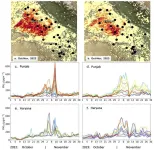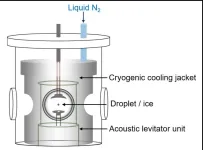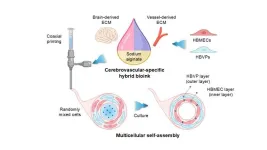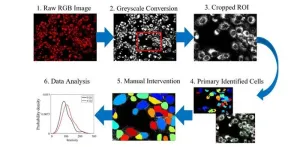(Press-News.org) BELMONT, Massachusetts, USA, 4 February 2025 - In a comprehensive Genomic Press Interview, Dr. Kerry Ressler, Chief Scientific Officer at McLean Hospital and Professor of Psychiatry at Harvard Medical School, unveils groundbreaking advances in understanding the neurobiological basis of post-traumatic stress disorder (PTSD) and related anxiety conditions.
Dr. Ressler's research bridges the gap between molecular neuroscience and clinical psychiatry, focusing on how the amygdala processes fear and trauma at cellular and genomic levels. "Most proximally, I hope that our work may lead to novel approaches to fear- and trauma-related disorders, perhaps even to prevent PTSD development in the first place," Dr. Ressler explains, highlighting the potential for intervention in emergency departments, on battlefields, or after mass disasters.
Recent breakthroughs from Dr. Ressler's lab include the largest genome-wide association study (GWAS) of PTSD to date, analyzing over one million subjects and identifying approximately 100 significant genetic loci. This research, published in Nature Genetics (2024), represents a major step toward understanding PTSD's genetic architecture.
"The field of Psychiatry is in desperate need of early 'wins' demonstrating that a neurobiology and/or genomic understanding of any of our disorders are sufficiently mature to lead to science-driven rational intervention approaches," Dr. Ressler emphasizes, pointing to the urgent need for translating scientific discoveries into effective treatments.
The interview reveals how Dr. Ressler's journey from MIT computer science student to psychiatric neuroscience leader was shaped by early exposure to molecular biology and systems neuroscience. His work with Nobel laureate Dr. Linda Buck on olfactory receptors inspired his career-long focus on using molecular genomic tools to investigate psychiatric conditions.
Dr. Ressler's team employs cutting-edge technologies, including cellular calcium imaging and intersectional optogenetics, to understand the mechanisms underlying fear and trauma responses. Their research extends from basic science to clinical applications, with recent publications in Science (2024) presenting groundbreaking findings from postmortem brain studies of PTSD and depression.
Current research directions raise intriguing questions about the potential for early intervention in trauma response. Can understanding the biological processes of fear and trauma memory consolidation lead to preventive treatments? How might genetic insights inform personalized approaches to PTSD treatment?
Dr. Kerry Ressler’s Genomic Press interview is part of a larger series that highlights the people behind today’s most influential scientific ideas. Each interview in the series offers a blend of cutting-edge research and personal reflections, providing readers with a comprehensive view of the scientists shaping the future. By combining a focus on professional achievements with personal insights, this interview style invites a richer narrative that both engages and educates readers. This format provides an ideal starting point for profiles that delve into the scientist’s impact on the field, while also touching on broader human themes. More information on the research leaders and research rising stars featured by Genomic Press can be found in our publication website: https://genomicpress.kglmeridian.com/.
The full Genomic Press Interview, titled “Kerry J. Ressler: Exploring the translation of amygdala function at the cellular and genomic levels to understand stress, fear, and trauma disorders, such as post-traumatic stress disorder (PTSD),” is available on 4 February 2025 in Genomic Psychiatry, offering readers an unparalleled opportunity to explore the thoughts and experiences of one of the most influential minds in neuroscience and neurobiology of brain disorders. The article is freely available online at https://doi.org/10.61373/gp025k.0005.
About Genomic Psychiatry – Genomic Psychiatry: Advancing Science from Genes to Society (ISSN: 2997-2388) represents a paradigm shift in genetics journals by interweaving advances in genomics and genetics with progress in all other areas of contemporary psychiatry. Genomic Psychiatry publishes peer-reviewed medical research articles of the highest quality from any area within the continuum that goes from genes and molecules to neuroscience, clinical psychiatry, and public health.
END
Neurogenetics leader decodes trauma's imprint on the brain through groundbreaking PTSD research
Harvard's Dr. Kerry Ressler shares insights on fear, trauma, and healing in an exclusive Genomic Press Interview exploring amygdala function
2025-02-04
ELSE PRESS RELEASES FROM THIS DATE:
High PM2.5 levels in Delhi-NCR largely independent of Punjab-Haryana crop fires
2025-02-04
International collaborative research led by Aakash Project* researchers at the Research Institute for Humanity and Nature (RIHN) show an unequivocal contribution of crop residue burning (CRB) to air pollution in the rural/semi-urban regions of Punjab and Haryana, and a relatively lower contribution than previously thought to the Delhi national capital region (NCR). We have installed 30 units of compact and useful PM2.5** in situ instrument with gas sensors (CUPI-Gs) and have continuously recorded air pollutants in 2022 and 2023. New analytical methods have been developed to assess ...
Discovery of water droplet freezing steps bridges atmospheric science, climate solutions
2025-02-04
A groundbreaking University of Hawaiʻi at Mānoa study on the freezing of water droplets suspended in air sheds light on a key process in Earth’s water cycle: the transformation of supercooled water into ice.
Conducted using a novel cryogenically cooled ultrasonic levitation chamber, the research captures real-time molecular-level changes during the freezing process, mimicking conditions in the Earth’s atmosphere. This innovative setup enables researchers to observe how water droplets transition to ice at subzero temperatures, providing ...
Positive emotions plus deep sleep equals longer-lasting perceptual memories
2025-02-04
Researchers at the RIKEN Center for Brain Science (CBS) have uncovered how perceptual memories linked to positive emotions, such as joy or happiness, are strengthened during sleep. The study, published in the scientific journal Neuron, could help scientists understand the neurological basis for overcoming conditions like drug or sexual addiction.
Why do emotional events, whether positive or negative, create strong, long-lasting memories of external information such as music, scene smells and textures received at the events? We know that sleep is essential for memory consolidation, the process that turns new events into memories, but do not ...
Self-assembling cerebral blood vessels: A breakthrough in Alzheimer’s treatment
2025-02-04
A 3D model accurately mimicking the Blood-Brain Barrier (BBB) in a laboratory environment has been successfully developed by research teams led by Professor Jinah Jang from the Departments of Mechanical Engineering, Life Sciences, IT Convergence Engineering, and the Graduate School of Convergence at POSTECH, and Professor Sun Ha Paek from the Department of Neurosurgery at Seoul National University Hospital. This study was recently published in Biomaterials Research, an international academic journal on materials science.
Neurodegenerative diseases, ...
Adverse childhood experiences in firstborns associated with poor mental health of siblings
2025-02-04
Children are nearly three-quarters (71%) more likely to develop mental health problems between the ages of five and 18, if the firstborn child in their family experienced adversity during their first 1,000 days, finds a new study led by UCL researchers.
The first-of-its-kind study, published in The Lancet Public Health and funded by the National Institute for Health and Care Research Policy Research Programme, found that mothers whose firstborns had experienced adverse childhood experiences had a 71% increased risk of having children (aged five -18) with mental health problems, compared to mothers whose firstborn did not experience adversity.
This ...
Montana State scientists publish new research on ancient life found in Yellowstone hot springs
2025-02-04
BOZEMAN – In a new publication in the journal Nature Communications, Montana State University scientists in College of Agriculture highlight fresh knowledge of how ancient microorganisms adapted from a low-oxygen prehistoric environment to the one that exists today. The work builds on more than two decades of scientific research in Yellowstone National Park by MSU professor Bill Inskeep.
The article, titled “Respiratory Processes of Early-evolved Hyperthermophiles in Sulfidic and Low-oxygen Geothermal Microbial Communities” was published Jan. 2. Authors Inskeep, a professor in the Department of Land Resources and Environmental Sciences, and Mensur ...
Generative AI bias poses risk to democratic values
2025-02-04
Generative AI, a technology that is developing at breakneck speed, may carry hidden risks that could erode public trust and democratic values, according to a study led by the University of East Anglia (UEA).
In collaboration with researchers from the Getulio Vargas Foundation (FGV) and Insper, both in Brazil, the research showed that ChatGPT exhibits biases in both text and image outputs — leaning toward left-wing political values — raising questions about fairness and accountability in its design.
The study revealed ...
Study examines how African farmers are adapting to mountain climate change
2025-02-03
A new international study highlights the severity of climate change impacts across African mountains, how farmers are adapting, and the barriers they face – findings relevant to people living in mountain regions around the world.
"Mountains are the sentinels of climate change,” said Julia Klein, a Colorado State University professor of ecosystem science and sustainability and co-author of the study. “Like the Arctic, some of the first extreme changes we're seeing are happening in mountains, from glaciers melting to extreme events. There's greater warming at higher elevations, so what's happening in mountains is foreshadowing what's going ...
Exposure to air pollution associated with more hospital admissions for lower respiratory infections
2025-02-03
Air pollution is a well-known risk factor for respiratory diseases such as asthma and chronic obstructive pulmonary disease (COPD). However, its contribution to lower respiratory infections —those that affect the lower respiratory tract, including the lungs, bronchi and alveoli— is less well documented, especially in adults. To fill this gap in knowledge, a team from the Barcelona Institute for Global Health (ISGlobal), a centre supported by the ”la Caixa” Foundation, assessed the effect of air pollution ...
Microscopy approach offers new way to study cancer therapeutics at single-cell level
2025-02-03
Understanding how tumors change their metabolism to resist treatments is a growing focus in cancer research. As cancer cells adapt to therapies, their metabolism often shifts, which can help them survive and thrive despite medical interventions. This process, known as metabolic reprogramming, is a key factor in the development of treatment resistance. However, current methods to study these changes can be costly, complex, and often destructive to the cells being studied. Researchers at the University of Kentucky have developed a new, simpler approach to observe these metabolic shifts in cancer cells, offering a more accessible and effective tool for cancer research.
As ...
LAST 30 PRESS RELEASES:
New knowledge on heritability paves the way for better treatment of people with chronic inflammatory bowel disease
Under the Lens: Microbiologists Nicola Holden and Gil Domingue weigh in on the raw milk debate
Science reveals why you can’t resist a snack – even when you’re full
Kidney cancer study finds belzutifan plus pembrolizumab post-surgery helps patients at high risk for relapse stay cancer-free longer
Alkali cation effects in electrochemical carbon dioxide reduction
Test platforms for charging wireless cars now fit on a bench
$3 million NIH grant funds national study of Medicare Advantage’s benefit expansion into social supports
Amplified Sciences achieves CAP accreditation for cutting-edge diagnostic lab
Fred Hutch announces 12 recipients of the annual Harold M. Weintraub Graduate Student Award
Native forest litter helps rebuild soil life in post-mining landscapes
Mountain soils in arid regions may emit more greenhouse gas as climate shifts, new study finds
Pairing biochar with other soil amendments could unlock stronger gains in soil health
Why do we get a skip in our step when we’re happy? Thank dopamine
UC Irvine scientists uncover cellular mechanism behind muscle repair
Platform to map living brain noninvasively takes next big step
Stress-testing the Cascadia Subduction Zone reveals variability that could impact how earthquakes spread
We may be underestimating the true carbon cost of northern wildfires
Blood test predicts which bladder cancer patients may safely skip surgery
Kennesaw State's Vijay Anand honored as National Academy of Inventors Senior Member
Recovery from whaling reveals the role of age in Humpback reproduction
Can the canny tick help prevent disease like MS and cancer?
Newcomer children show lower rates of emergency department use for non‑urgent conditions, study finds
Cognitive and neuropsychiatric function in former American football players
From trash to climate tech: rubber gloves find new life as carbon capturers materials
A step towards needed treatments for hantaviruses in new molecular map
Boys are more motivated, while girls are more compassionate?
Study identifies opposing roles for IL6 and IL6R in long-term mortality
AI accurately spots medical disorder from privacy-conscious hand images
Transient Pauli blocking for broadband ultrafast optical switching
Political polarization can spur CO2 emissions, stymie climate action
[Press-News.org] Neurogenetics leader decodes trauma's imprint on the brain through groundbreaking PTSD researchHarvard's Dr. Kerry Ressler shares insights on fear, trauma, and healing in an exclusive Genomic Press Interview exploring amygdala function







